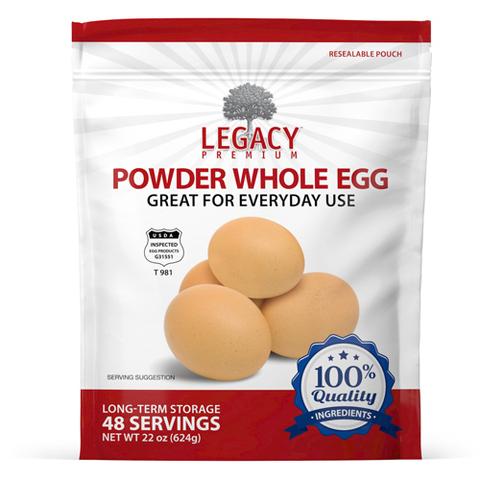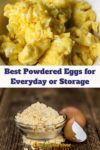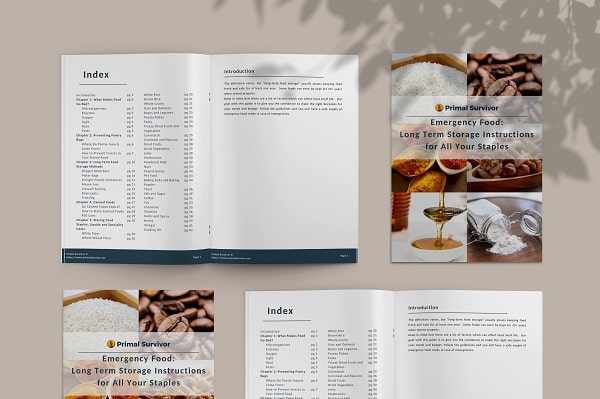Want to stockpile eggs for emergencies? Eggs are surprisingly one of the trickiest items to store long-term. Unless you invest in a freeze dryer machine, you’ll need to buy powdered eggs.
Quick Picks
- Best overall: Legacy freeze-dried egg powder. Buy | Read Review
- Most affordable option: Eggylicious egg powder. Buy | Read Review
- Best for long shelf life: Ready Wise. Buy | Read Review
Best Whole Egg Powders
 Legacy Whole Egg Powder
Legacy Whole Egg Powder
The egg powder by Legacy is freeze-dried, so it has a slightly better texture than spray-dried eggs. Freeze drying does mean these powdered eggs are a bit more expensive.
It is probably worth paying the higher price because of the longer shelf life.
The smaller packaging is also more convenient than the bulk packages on other long-shelf-life powdered eggs.
- Freeze-dried
- 22oz pouches
- 10 to 15-year shelf life
Verdict: Top choice – Great balance of affordability and very long shelf life.
 Augason Farms Dried Whole Egg
Augason Farms Dried Whole Egg
This isn’t the cheapest egg powder available, but it is pretty close. The price per egg ends up being low enough that you can buy these in bulk.
The great thing about Augason powdered eggs is the packaging. The egg powder comes in 2lb 1oz cans with oxygen absorbers. This packaging means the eggs can last 10 years.
- Spray-dried
- 2lb 1oz cans
- 10-year shelf life
Verdict: Second choice – more affordable but slightly shorter shelf life and texture not as great.
 Judee s Dried Whole Egg Powder
Judee s Dried Whole Egg Powder
Judees powdered eggs are very affordable and one of the cheapest you’ll find. The eggs come in various sized pouches, including cheaper bulk pouches.
The shelf life is pretty short, so these are better for everyday use than bulk stockpiling.
- Spray-dried
- Resealable pouch, various sizes
- 1 to 1.5-year shelf life
Verdict: Good option for everyday use but not great for bulk stockpiling.
 ReadyWise Powdered-Egg Bucket
ReadyWise Powdered-Egg Bucket
ReadyWise is an emergency preparedness food brand that sells bulk freeze-dried products. They make it incredibly convenient to get prepared because the food pouches come in bulk buckets.
These powdered eggs have a shelf life of 25 years. However, while ReadyWise has some good deals, the price per egg is very high.
- Freeze-dried
- Mylar pouches in bulk bucket
- 25-year shelf life
Verdict: Choose if you want to get prepped for emergencies quickly, even if it costs you more
 VFS Freeze Dried Whole Powdered Eggs
VFS Freeze Dried Whole Powdered Eggs
Valley Food Storage is another emergency food brand. Their powdered eggs are very similar to ReadyWise in packaging and shelf life.
- Freeze-dried
- Mylar pouches in bulk bucket
- 25-year shelf life
Verdict: Good for long-term preparedness.
 Eggylicious Whole Egg Powder
Eggylicious Whole Egg Powder
When it comes to price, Eggylicious were the cheapest powdered eggs I could find.
They come in 1lb plastic containers with a screw lid. This type of packaging isn’t air-tight, so it’s no surprise the shelf life is only about 12 months.
*The brand doesn’t say how the egg powder is made, but they are most likely spray dried.
- Spray-dried*
- 1lb plastic container with screw lid
- 12-month shelf life
Verdict: Most affordable option, though not great for long-term storage.
 Cracked Up Whole Powdered Eggs
Cracked Up Whole Powdered Eggs
Cracked Up is a bulk egg powder that ends up being really cheap per serving. It comes in large bags with 70 servings per bag.
The shelf life is 18 to 36 months, which is pretty good. However, the packaging isn’t great. If you don’t use the egg powder quickly after opening the bag, it can get clumpy or rancid.
- Spray dried*
- 32oz resealable pouches
- 18 to 36-month shelf life
Verdict: Great value if you use powdered eggs often
 OvaEasy Whole Egg Crystals
OvaEasy Whole Egg Crystals
OvaEasy is a really popular brand of powdered eggs. I’ve included it here, but it is my last pick. The reason is that it is pricier than almost all other brands. It’s too expensive for bulk buying or even regular use.
I also don’t like the packaging: the bag doesn’t contain oxygen absorbers and can’t be resealed. As for taste, people either love it or hate it.
However, because OvaEasy is available in small packages, it is a good option if you’ve never tried egg powder before and want to sample some before buying in bulk.
Verdict: Too expensive for regular use but good if you want to try powdered eggs
What Are Powdered Eggs?
Powdered eggs are real eggs that have all moisture removed from them. They are made by using either freeze-drying or spray drying.
Freeze Drying:
Freeze-drying involves putting foods into a special chamber that freezes the food so the water in it turns to ice. A pump then removes air from the chamber to create a vacuum, thus creating a low-pressure environment. The ice evaporates in this environment, and special condensers remove the water vapor, leaving you with dry food.
Spray Drying:
Spray drying is a process that turns liquids into dry powder.
To spray dry eggs, they are first preheated and then put into the spray drying chamber. Very hot air (up to 300F) passes through the chamber. The hot air causes moisture to evaporate rapidly, leaving behind a powder. The powder separates from the air and is removed from the chamber.
Which is better: Freeze-dried or spray-dried eggs?
Both freeze-dried and spray-dried eggs are very similar. Most people won’t be able to notice much of a difference between the final products.
However, freeze-dried eggs usually are slightly better in terms of texture. Freeze-dried eggs also reconstitute better. This is because spray drying heats the eggs, thus changing their composition.
Spray drying is usually cheaper and easier to produce large batches. Because of this, most powdered eggs are made with spray drying and not freeze-drying.
Can I Make Powdered Eggs At Home?
If you have a home freeze-drying machine, you can make powdered eggs at home. These machines are expensive, though, and not widely available. Spray drying machines aren’t designed for home use. They are usually massive industrial machines that cost thousands of dollars to buy.
Is it possible to make egg powder in a dehydrator?
No, it is not possible to make powdered eggs with a food dehydrator. The proteins get very hard when you dry eggs on a home dehydrator. They end up gross and rubbery when you try to rehydrate them and don’t even work for baking.
*Note that plenty of videos online show how to dehydrate eggs and blend them into a powder. The eggs will get dry – they lose all their desirable properties. You need a spray dryer or freeze dryer if you want to make powdered eggs!
Also read: Foods you can’t dehydrate
Powdered Eggs vs. Fresh Eggs
When cooked, powdered and fresh eggs taste the same. The texture of powdered eggs is sometimes a bit different, though, especially if you didn’t mix the powder with water well enough.
Nutritionally, both are great sources of protein and minerals. Powdered eggs have fewer vitamins and certain other nutrients than fresh eggs because those nutrients break down during production and storage.
So, fresh eggs are better than powdered eggs in texture and nutrition (though not by much). Fresh eggs are also usually cheaper than powdered eggs. However, powdered eggs are better in almost every other way.
Benefits of Powdered Eggs:
- Don’t break or crack
- Have a very long shelf life
- Easy to transport
- Take up less space in storage
*If you don’t want to buy powdered eggs, another option is to freeze eggs.
What’s your favorite brand of powdered eggs? Let us know in the comments section below.
https://www.journalofdairyscience.org/article/S0022-0302(52)93677-1/fulltext
https://www.sciencedirect.com/science/article/pii/B9780121579203500119
https://onlinelibrary.wiley.com/doi/abs/10.1111/j.1365-2621.1971.tb03286.x
https://backpackinglight.com/forums/topic/78366/
https://www.reddit.com/r/trailmeals/comments/2ch3mm/whats_the_best_dehydrated_or_freeze_dried_eggs/



Love your articles and product suggestions, as I try to educate myself on responsible personal food preparedness. Kind of strange, the reactions that I get if I try to bring up the subject to those that “are not of a planning / preparedness mindset…”
You can not discuss it with most everyone. Sadly, they have to wake up first, and time is running out.
I prefer the freeze dried eggs that I purchase from Thrive Life. I cannot tell the difference between my fresh scrambled eggs and the Thrive Life scrambled eggs usually. TL egg powder is supposed to be good for 20 years.
Just like in the Navy. 🙂
Thank you for all of your articles. I appreciate your vast knowledge in storing foods long-term and how you take the time to comprehensively explain each topic. I especially appreciate that you are very concerned about food safety! As far as this article, I had a few questions about Judee’s or Egglicious dried whole eggs: Is it possible to safely repackage these products in a sealed mylar bag with O2 absorbers so as to extend the shelf life to 10-15 years? (Is the moisture content low enough in these products to use O2 absorbers?) Finally, will freezing the dried whole egg powder in a sealed mylar bag with O2 absorbers further extend the shelf life? If so, this seems to be the most affordable route in storing dried whole eggs long term.
Repackaging in Mylar with O2 absorbers will help extend the shelf life. But eggs are high-fat, and fats will go rancid even with O2 absorbers. The most important thing with fatty foods is to keep them in a cool temperature. So, storing them in the freezer would extend the shelf life “indefinitely” (basically, they will last forever in the freezer). There’s no need to use O2 absorbers when freezing food.
Personally though, I don’t recommend storing emergency food in the freezer. If the power goes out, all that food will go bad. Even if the power outage is just for a short people, the change in temperature could cause moisture pockets to form. So, if you are going to store it in the freezer, don’t use O2 absorbers. Just put them in a sealed Mylar bag without an O2 absorber.
Thank you again, Diane, for your time and helpful advice. I have purchased some whole egg powder in #10 cans from Augason Farms and Ready Hour, but before that, I purchased several packages of Judee’s whole egg powder–frankly, because it was far more affordable! I will plan on storing the Judee’s whole egg powder that I have already purchased in the freezer in a mylar bag to extend the shelf life as long as I can, and I will be sure to use it first in an emergency situation!
I manufacture a pet supplement that includes powdered whole eggs. Your input is tremendously eye-opening and note worthy. Thank you so very much. This new information will result in my editing my product label.
Thank you for this valuable information. We have a HarvestRight machine and have been preserving our eggs that way. Glad to confirm that it is one of the best methods for eggs.
Legacy states, “Food will last up to 1 month after breaking the seal”. I’m not sure I could use it up in a month. Would it be possible to pour some out and then add an OA and reseal since it is in a mylar bag for long-term storage?
Yes, you can definitely repackage into smaller quantities. When resealing Mylar bags, just make sure the seal area is clean. If even a tiny bit of food matter gets into the seal area, it might not seal well and you could have air leaking in. This is true whenever you pack food in Mylar though, regardless of whether you are reusing the bad.
Hello all…have enjoyed all the informative and helpful articles I started dehydrating eggs and yes it was a yucky mess to hard to powder but when I was younger I use to try my hand at egg souffle it was beaten egg whites and added yolk… I have been very successful using this method…with egg whites beaten till stiff and slowly add yolks it is a very stiff mix and I can pour out “pancakes” and dehydrate these on a flat suface… I can get 10 eggs on 8 flat trays and dry them in 4 hours…this is no lie.. I wish more people would try this method.
I still have to finger crush and sift and put into a coffee grinder but the results are fantastic but I am also very frugal and already have an abundance of eggs .Best of Wishes to everyone Stay Safe
Thanks for sharing. I’ll have to test that out. I’ve only had really bad results when dehydrating eggs. I have dehydrated baked goods with eggs in them though. Dehydrated pancakes are surprisingly yummy when rehydrated with hot milk.
How long do pickled / hard-boiled eggs keep in their brine in a normal refrigerator? does the list/concentration of ingredients matter?
They should be good for around 4 months if kept in the fridge. I’d say that the concentration does matter, but it’s pretty much impossible to know for certain unless you want to invest in some fancy lab equipment and test the acidity level, microbe level, etc of your pickled goods. 🙂 Just be really diligent about taking pickled foods out with clean forks or spoons. I’ve had some batches go bad on me because I was lazy about that.